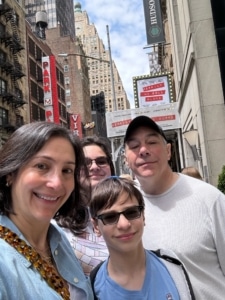I’ve been reading Shakespeare for almost three decades.
I read Shakespeare to my students—both in novelization form and the original text—and, prior to the pandemic, I also directed a Shakespearean play every year.
But I also read it independently and often. I adore the stories, the language, and the questions Shakespeare poses – old and new – every time I dive in.
Here’s another benefit to reading Shakespeare:
You become a member of a group of people who hear and see Shakespeare everywhere. You are someone encapsulated in a perpetual, ever-expanding inside joke.
Elysha, the kids, and I recently saw the Broadway musical Merrily We Roll Along in New York City. It was a great and tragic story of three people who struggle to remain true to one another and their art in the rising demands for money and fame. The story is told in reverse, beginning with their tragic downfall and then charting back to their first moments together as talented, idealist young people.
It’s heartbreaking.
And as a reader of Shakespeare, I heard the Shakespearean lines included in the show, echoing the tragic falls of Hamlet and Macbeth. While many or most in the theater heard, “A hit! A very palpable hit!” and understood the words in the context of the story, I also heard the voice of Osric declaring that Hamet had scored a point against Laertes in a duel about to go terribly wrong for both men.
This happens all the damn time.
“The Lion King” is a retelling of Hamlet. “West Side Story is a retelling of Romeo and Juliet.” “Ten Things I Hate About You” is a retelling of “The Taming of the Shrew.” And Shakespearean lines abound in everything from The Simpsons to “Hamilton” to Star Trek and “Clueless” to much more.
I’ve heard Shakespeare in commercials, music, and Saturday Night Live.
Shakespeare is everywhere.
Shakespeare also invented about 1,700 words, and though I don’t know most of them, I always smile when I hear a word like bedazzled, swagger, laughable, and fashionable, knowing that they originated in a Shakespearean text.
It’s often assumed that Shakespeare is too challenging to read for pleasure, and many assume that it’s even too difficult to understand, given its 500-year-old language, but none of this is true. And there are ways to make the text more accessible, including reading a novelization first to understand the play better or reading an annotated copy.
Either way, the stories are worth reading and knowing. As a bonus, you, too, can become a member of an exclusive club that hears and understands Shakespeare as it continues to proliferate throughout modern culture.
I suggest you start with “Macbeth.”










